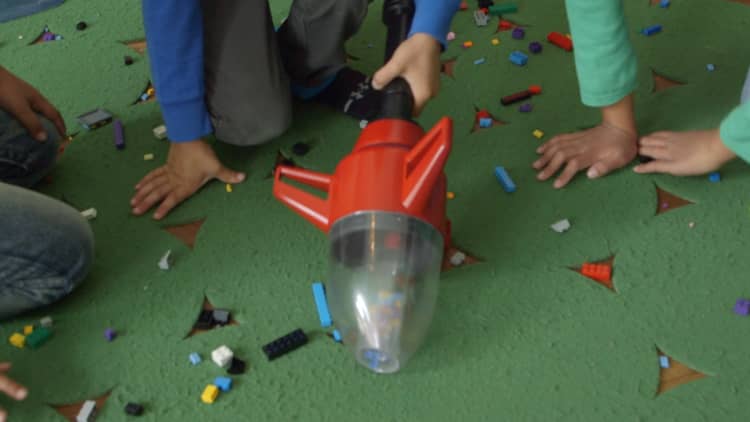Shakespeare's famous line "What's in a name?" may seem like fodder for classic literature enthusiasts, but when taken out of context and applied to the world of business, the question remains just as relevant.
In fact, a company's name is one of the factors that can determine whether it succeeds or fails.
On the latest episode of CNBC's "Make Me a Millionaire Inventor," Korean-born entrepreneur June Knoh presents his toy-cleaning product, Brickhole. He believes the name he's picked is perfect.
It's a "device that actually sucks up all the brick toys, so it's like a black hole, sucking up everything," says Knoh, who invented the product in Queens, New York, inspired by his two young children.
His invention, designed to make clean-up time faster and more fun, earns rave reviews from a test group of parents and children. But its name is nearly universally panned.
"It sounds too close to a curse word," one mother notes. "Kids get creative when it comes to this kind of [word] stuff."
After some encouragement from engineer and co-host Deanne Bell to change the name to something more kid-friendly, Knoh rebrands the product ToyVac.
"I love it," says Bell. "I wanted it to be short and catchy and fun but also really transparent about what it is, especially for a brand new product on the market. You want people to see it and know exactly what it is."
ToyVac ultimately wins a $60,000 investment from angel investor Stephen Stokols – an achievement that might have remained out of reach had Knoh not consented to a name makeover.
Though the word Brickhole may seem like an obvious no-no for a kid's toy cleaner, Knoh is hardly the first to struggle with finding the right name. A number of billion-dollar companies, many of whom make up the S&P 100, also rebranded themselves shortly after they started.
Subway / Pete’s Super Submarines / Doctor’s Associates Inc.
Subway experimented with two names in its formative years. Founders Fred DeLuca and Dr. Peter Buck in 1965 first dubbed their Bridgeport, Connecticut, sandwich shop "Pete's Super Submarines." A year later, they changed the name to Doctor's Associates Inc., in homage to the fact that DeLuca hoped the sandwich business would pay his college tuition and help him become a doctor like his business partner. The name didn't resonate, in part because it left unclear whether the store offered foot-longs or foot specialists.
By 1968, the company changed its name to the much pithier Subway and was headed straight for success.
Google / Backrub
Google co-founders Larry Page and Sergey Brin, fellow PhD students at Stanford originally called the search engine they were developing in 1996 "Backrub," as a nod to the way their computer program could analyze the web's backlinks. A year later, unhappy with the name, they registered their domain as Google, a play on the word "googol," a mathematical term for a nearly infinite number that signified the seemingly infinite amount of information on the web. Now it's the world's most popular search engine – but who knows if the words "backrub it" and "backrub map it," would have ever caught on.
Pepsi-Cola / Brad’s Drink
In 1893, Pepsi-Cola founder Caleb Davis Bradham, began serving a mixture of sugar, water, caramel, lemon oil, nutmeg and other additives at his North Carolina drug store. He called it "Brad's Drink." Five years later, though, he wisely trademarked it Pepsi-Cola after the digestive enzyme pepsin and kola nuts once used in the recipe.
Amazon / Cadabra
The original name for the world's largest online retailer wasn't always Amazon. In 1994, Jeff Bezos wanted to call the company Cadabra, as in the magic word, "Abracadabra." After his lawyer misheard the name over the phone as "cadaver," Bezos realized he needed to make a shift. The new name, Amazon, referred to the world's largest river by volume, and signified the massive scale of his site as well as his ambitions.
Now, after years of effort — not magic — the company boasts a market capitalization of $385 billion.
Video by CNBC's Brandon Ancil.



